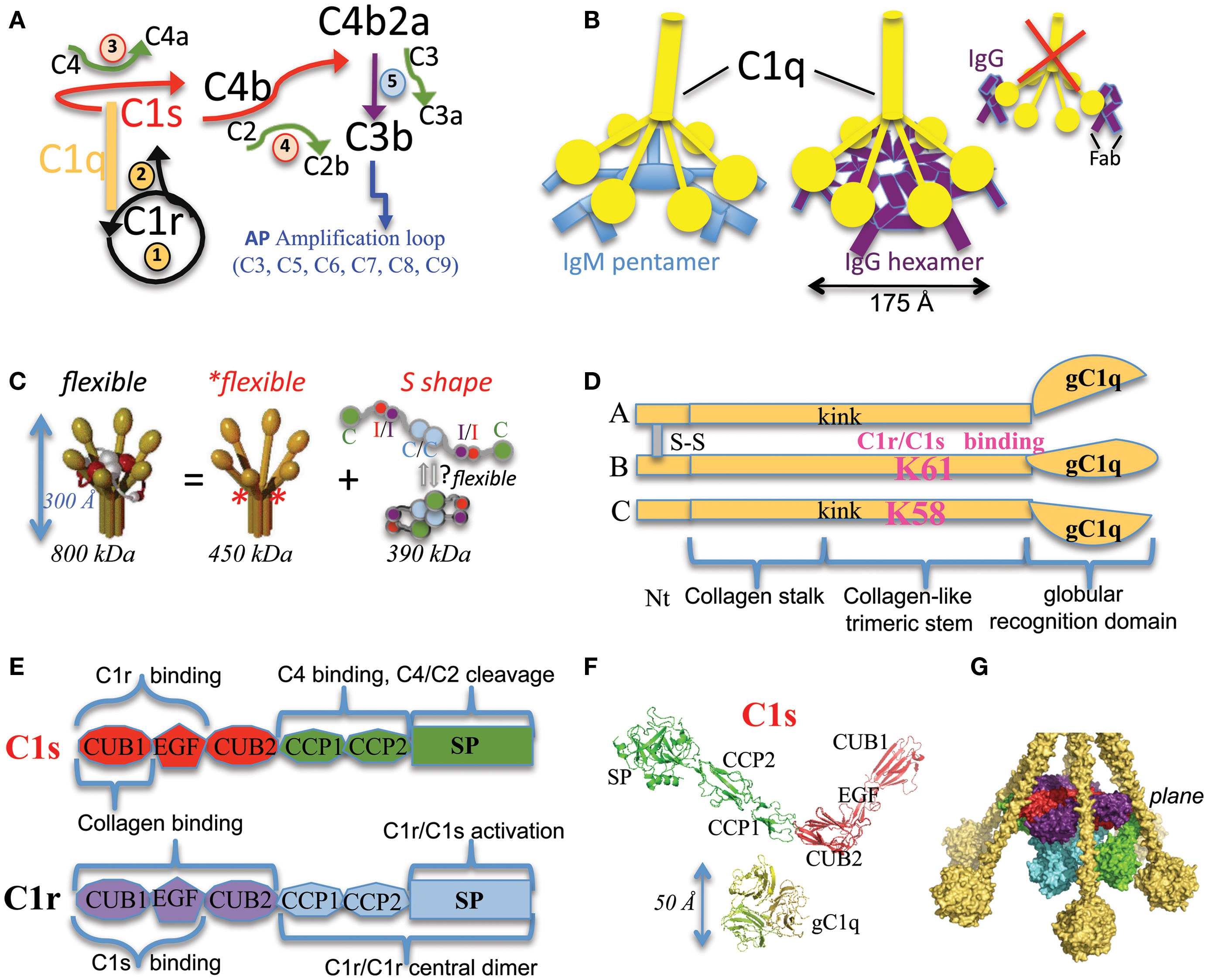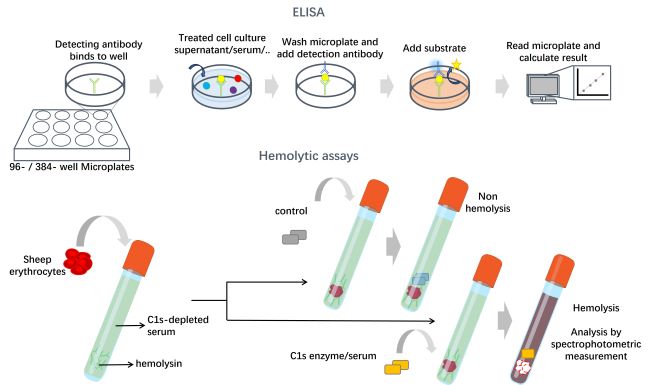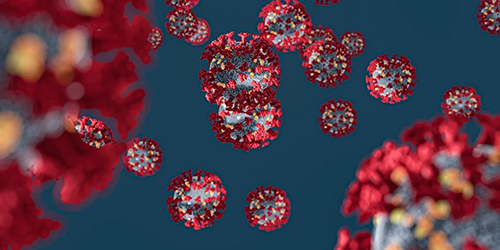Overview Workflows Applications Related Products Featured Services Protocols Q&A Resources
Creative Biolabs offers customized, top-quality functional assays for complement C1s, leveraging cutting-edge technologies and extensive scientific expertise to assist clients in progressing therapies aimed at the complement system.
Overview of Complement C1s
Complement component 1s (C1s) is a protein integral to the complement system and forms part of the C1 complex, encoded by the C1S gene in humans. The primary stages of the complement activation cascade via the classical pathway involve the multimeric C1q molecule associating with the C1s–C1r–C1r–C1s tetramer. Upon C1q binding to an activating target surface, a conformational change initiates the auto-activation of the associated C1r protease, which subsequently activates C1s. This activation of C1s cleaves C4 and C4b-bound C2, leading to the formation of the classical pathway C3 convertase, C4b2a.
 Fig.1 Key functional and structural components of the classical pathway activation.1
Fig.1 Key functional and structural components of the classical pathway activation.1
Complement C1s Functional Assay Introduction
Method
The complement C1s functional assay is a laboratory technique aimed at evaluating the activity and functionality of the C1s component within the complement system across diverse samples, employing hemolysis-in-gel assays and the Complement System Classical Pathway ELISA. Moreover, C1s’ levels are quantified using electroimmunoassay and expressed as a percentage relative to the concentration in a standard serum pool derived from healthy blood donors.
Analysis
A statistical analysis of C1s ELISA data was conducted, utilizing either a 2-tailed t-test (parametric) or a paired t-test (non-parametric) for comparisons between two groups, and a 1-way ANOVA followed by a post hoc multiple comparison test for assessments across multiple groups. Results from hemolytic assays can be quantified through spectrophotometric measurement.
Workflow of Complement C1s Functional Test

Applications
In Disease Detection: The C1 complex, consisting of C1q, C1r, and C1s (C1qr2s2), acts as the trigger for the classical pathway of complement activation. A deficiency in C1s may significantly elevate the risk of developing autoimmune ailments such as lupus erythematosus. As C1s’ activation occurs in various pathological conditions and is linked to inflammation, autoimmunity, and cancer progression, it is emerging as a crucial biomarker for diagnosing and managing a wide range of diseases.
Drug development: The interaction of antibodies with C1s impedes the activation of linked serine proteases (C1s–C1r–C1r–C1s), thereby inhibiting subsequent complement activation. Dysregulation of the classical pathway activation is associated with antibody-driven inflammatory disease processes. Investigating the potential of anti-C1s antibodies in pre-clinical studies could highlight their viability as therapeutic agents in treating antibody-mediated disorders of the classical pathway.
Related Products
Featured Services

|

|
|
Total Complement Activity Test
|
Complement Multiplex Assay Services
|
|
Creative Biolabs offers total complement activity test services for our clients. Total complement activity tests include CH50, AH50, and LP50.
|
Creative Biolabs excels in advanced complement multiplex assay services, designed to advance complement protein characterization and therapeutic development by allowing concurrent analysis of multiple complement proteins.
|
|
Learn more
|
Learn more
|
Protocols
Questions & Answer
A: A complement C1s functional assay evaluates the activity and function of the C1s protein in the classical complement pathway. Creative Biolabs offers tailored assays, including ELISA and hemolysis-in-gel techniques, to measure C1s’ functionality. This assay is essential for elucidating immune responses in autoimmune disorders, inflammatory conditions, and cancer.
A: Several laboratory methodologies are utilized to assess complement C1s activity, including ELISA and functional tests such as the hemolytic assay and electroimmunoassay.
A: Creative Biolabs specializes in functional assays for complement C1s, crafted to support drug development through the evaluation of anti-C1s antibodies as potential therapeutic agents. Our tailored services are perfectly suited for preclinical research aimed at addressing antibody-mediated inflammatory conditions. Partner with us to propel innovation in your drug development endeavors.
A: Multiple elements can impact the precision of complement C1s functional test outcomes, such as the handling and processing of samples, the laboratory methodologies employed, and any medications the patient might be using that could disrupt the complement system.
A: Indeed, we offer our complement C1s functional testing services globally. Nonetheless, it is important to recognize that shipping regulations differ across countries, so please ensure compliance with your local laws when dispatching samples.
Resources
Creative Biolabs is dedicated to providing effective and practical services focused on the complement system, backed by a dependable and standardized testing platform. We provide customized C1s functional assays developed for swift evaluation of complement activity. We invite you to reach out to us with any questions or interests concerning the complement function assay.
Reference
-
Gaboriaud, Christine, et al. "Deciphering the fine details of c1 assembly and activation mechanisms: “mission impossible”?" Frontiers in Immunology 5 (2014): 565. Distributed under Open Access license CC BY 4.0, without modification.
For Research Use Only.
Related Sections:

 Fig.1 Key functional and structural components of the classical pathway activation.1
Fig.1 Key functional and structural components of the classical pathway activation.1





